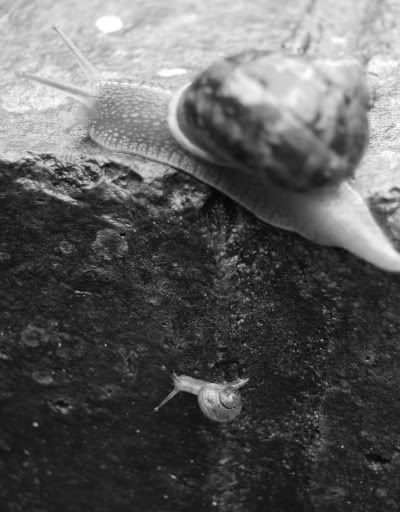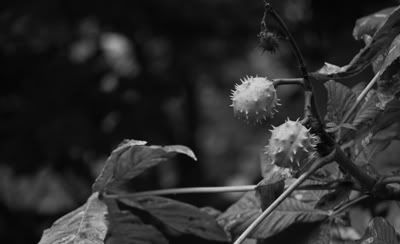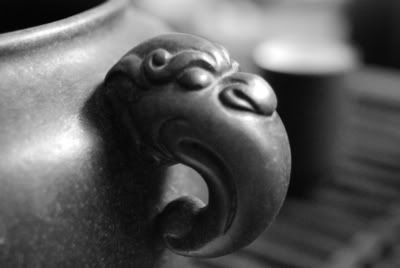I can feel autumn approaching. Where went the fleeting summer? Even the chestnut trees are preparing for conker season...
During this busiest of cold English summers, I have had the great fortune to enjoy some excellent teas, and I hope you have, too. Though not yet having sufficient time to transcribe my notes concerning them, my tea-table has been a constant source of happiness, and a something of a refuge. To those tea-friends old and new with whom I have been exchanging samples, many thanks for some real treats. I will make my notes available here in due course.
Today, I interrupt my temporary hiatus to write about a splendid sample, kindly provided by the eternally generous Nada.
This is Lao Banzhang, that most expensive of pu'er leaves, which Nada obtained from the village of Lao Banzhang itself (and readers will have read of his journey already, no doubt). He reports that a number of guards are employed to ensure that illicit leaves are not brought into the village and sold using the village's prestigious appellation. With so many cakes being sold under the name "Lao Banzhang", the overwhelming majority of which contain but a portion of actual Lao Banzhang leaves (if any at all), the prospect of drinking personally-selected leaves from the village itself is a rare treat.
What is the flavour and character of actual Lao Banzhang?
This is part of the 2008 spring harvest. The leaves, pictured above, are large and hearty, with some very large tips. A gentle aroma of sweetness was a little more subdued than I expected.
Sporting a rather persistent hangover (obtained courtesy of the traditional Pimms taken aboard a punt on the Cherwell last night), the prospect of a remedial session with shengpu is appealing. Magdalen College's Great Tower informs me that it is 8.30 a.m., sounding even louder today than its usual unbearable volume. Lao Banzhang, make me well...
Here's why I like maocha: it's honest. The yellow soup (pictured below) testifies to its honesty. No tweaking has been performed with this tea, no artificial attempt at accelerated aging or complexity so often found in "boutique" bingcha. All teas have their place, and my shelves have many such tweaked teas on them, but honest shengpu will always be my favourite.
Like the dry leaves, the beidixiang [initial scent in the aroma cup] is quite subdued. The lengxiang [later scent as the aroma cup cools], however, is darkly sweet, with plenty of power. The progression of scents in the wenxiangbei usually correlates to the progression of the tea in the mouth, and would, in this case, indicate a strong huigan.
The quality of the tea is obvious from the first sip: it is extraordinarily thick and smooth, and packed with mushroom flavours. It has an unrushed, stately progression through the mouth, settling eventually into a huigan that swells with sweetness (corresponding to that noted in the aroma cup).
Two small cups and I am alert, my lips buzzing. The soup leaves a cooling sensation in my mouth, which I take to refer to its quality. It would be a crime to rush this tea, which wishes to proceed at its own pace, swelling as it does in its progression from lips to throat.
There is no aggression in this tea, though strong ku [pleasant, youthful bitterness] becomes more obvious in later infusions.
Notably, this tea does not become rough near the end of the session, as do many inferior teas. Rather, it elegantly fades into gentle sweetness. This graceful degradation is another sign of excellence, in my estimation.
The leaves (shown above) are strong, healthy, and very attractive. They are smooth to handle, and tear only under significant force, in contrast to the wafer-thin, anaemic leaves of some plantations.
All in all, this is a very fine tea. The smooth, rounded quality is a real mouthful, and the mushroom flavour is so pronounced that it came as quite a surprise.
Once again, very many thanks to Nada for so kindly providing the tea for this valuable lesson, and for an effective hangover cure.
I note with pleasant surprise that Nada has started his own tea company, Nada Cha. I should add by means of disclosure that I have no connection with this enterprise, other than being wholly supportive of a friend's venture.

It is with some happiness that I see his excellent hand-selected 2008 Nadachayuan "Cha Chan Yi Wei" cakes have already sold out, which means that others will also be enjoying this lovely tea. I am sure we all welcome potential new sources of tea, and I hope Nada Cha thrives.
By happy chance, I see that I have already obtained most the teas listed on his web-site through his recent expedition to Yunnan. Given that these cakes are commercially available, I shall endeavour to provide notes that are as unbiased as I can manage, as I would teas from any other vendor. I trust that you, Dear Reader, will hold me to account as necessary...






